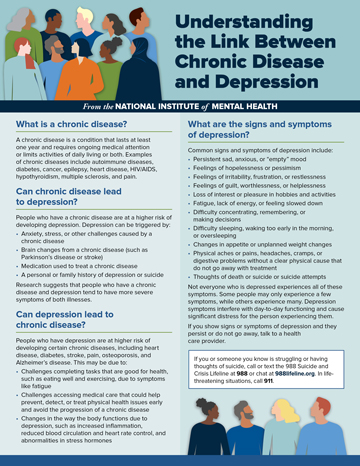Understanding the Link Between Chronic Disease and Depression
What is a chronic disease?
A chronic disease is a condition that lasts at least one year and requires ongoing medical attention or limits activities of daily living or both. Examples of chronic diseases include autoimmune diseases, diabetes, cancer, epilepsy, heart disease, HIV/AIDS, hypothyroidism, multiple sclerosis, and pain.
Can chronic disease lead to depression?
People who have a chronic disease are at a higher risk of developing depression. Depression can be triggered by:
- Anxiety, stress, or other challenges caused by a chronic disease
- Brain changes from a chronic disease (such as Parkinson’s disease or stroke)
- Medication used to treat a chronic disease
- A personal or family history of depression or suicide
Research suggests that people who have a chronic disease and depression tend to have more severe symptoms of both illnesses.
Can depression lead to chronic disease?
People who have depression are at higher risk of developing certain chronic diseases, including heart disease, diabetes, stroke, pain, osteoporosis, and Alzheimer’s disease. This may be due to:
- Challenges completing tasks that are good for health, such as eating well and exercising, due to symptoms like fatigue
- Challenges accessing medical care that could help prevent, detect, or treat physical health issues early and avoid the progression of a chronic disease
- Changes in the way the body functions due to depression, such as increased inflammation, reduced blood circulation and heart rate control, and abnormalities in stress hormones
What are the signs and symptoms of depression?
Common signs and symptoms of depression include:
- Persistent sad, anxious, or “empty” mood
- Feelings of hopelessness or pessimism
- Feelings of irritability, frustration‚ or restlessness
- Feelings of guilt, worthlessness, or helplessness
- Loss of interest or pleasure in hobbies and activities
- Fatigue, lack of energy, or feeling slowed down
- Difficulty concentrating, remembering, or making decisions
- Difficulty sleeping, waking too early in the morning, or oversleeping
- Changes in appetite or unplanned weight changes
- Physical aches or pains, headaches, cramps, or digestive problems without a clear physical cause that do not go away with treatment
- Thoughts of death or suicide or suicide attempts
Not everyone who is depressed experiences all of these symptoms. Some people may only experience a few symptoms, while others experience many. Depression symptoms interfere with day-to-day functioning and cause significant distress for the person experiencing them.
If you show signs or symptoms of depression and they persist or do not go away, talk to a health care provider.
If you or someone you know is struggling or having thoughts of suicide, call or text the 988 Suicide and Crisis Lifeline at 988 or chat at 988lifeline.org . In life-threatening situations, call 911.
How is depression treated?
Depression is treatable—even if you have a chronic disease.
Depression treatment typically involves psychotherapy (in person or virtual), medication, or both.
A health care provider can help you choose the right treatment plan based on your needs, preferences, and existing medical conditions. Tell the provider about the medications you take and treatments you undergo to avoid multiple medications interfering with one another.
If you cannot or do not wish to take antidepressant medication, other evidence-based treatments are available, including psychotherapy, brain stimulation therapy, and light therapy.
You may have to try a few treatments to find the best one for you. With treatment, you can feel better. Learn more about treatments for depression.
Research suggests that a “collaborative care approach” can improve the overall health of people with depression. In this approach, primary care providers, care managers, and psychiatric consultants work together to provide mental and physical health care at the same location. Collaborative care is not yet available in all primary care offices or clinics—ask your health care provider if it’s an option for you.
How can I find help?
If you have concerns about your mental health, talk to a primary care provider. They can refer you to a qualified mental health professional, such as a psychologist, psychiatrist, or clinical social worker, who can help you figure out the next steps. Find tips for talking with a health care provider about your mental health.
You can learn more about getting help on the NIMH website. You can also learn about finding support and locating mental health services in your area on the Substance Abuse and Mental Health Services Administration (SAMHSA) website.
What are clinical trials and why are they important?
Clinical trials are research studies that look at ways to prevent, detect, or treat diseases and conditions. These studies help show whether a treatment is safe and effective in people. Some people join clinical trials to help doctors and researchers learn more about a disease and improve health care. Other people, such as those with health conditions, join to try treatments that aren’t widely available.
NIMH supports clinical trials across the United States. Talk to a health care provider about clinical trials and whether one is right for you. Learn more about participating in clinical trials.
Reprints
The information in this publication is in the public domain and may be reused or copied without permission. However, you may not reuse or copy images. Please cite the National Institute of Mental Health as the source. Read our copyright policy to learn more about our guidelines for reusing NIMH content.
U.S. DEPARTMENT OF HEALTH AND HUMAN SERVICES
National Institutes of Health
NIH Publication No. 24-MH-8015
Revised 2024

